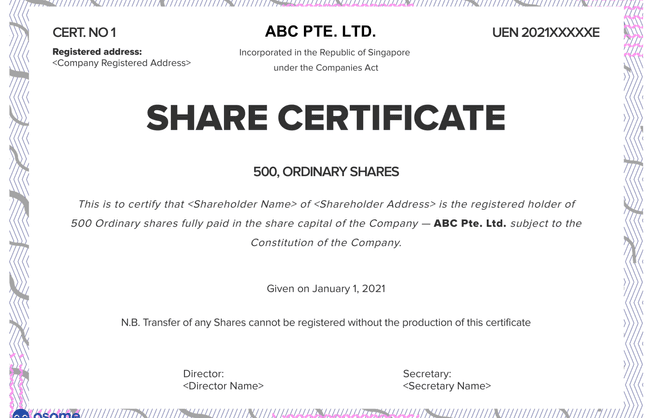

Always game for a good cup of iced latte and soggy fries, Lim Wan Er indulges in a solo vacation at least once a year for the sole purpose of exploring the local cuisine.
When you first complete the incorporation of your company, you will have to issue share certificates. As your company grows, you might also want to raise more capital to run your business by selling parts of your company via shares.
To understand more about shares, this article will go through what a share certificate is, when and why they are issued, and what it means for companies issuing these share certificates.
To put it simply, a share certificate is a verification that proves you own shares of a company, and that you are a certified shareholder of that company. As an investor, you will realise that these certificates are now electronically deposited into your Central Depository (CDP) accounts instead of receiving a hardcopy document. Note that paper share certificates are only issued by private limited companies. If the company that you have bought in is publicly listed, you will be issued the electronic version instead.
If you are starting a new company, you will first need to issue a share certificate when your company is being incorporated. After that, share certificates will be issued when you give out, transfer or sell shares of your company.

Something to note: Before March 2017, every share certificate must be stamped with the company’s official or common seal. Since 2017, companies and limited liability partnerships (LLPs) will not have to use a seal. Instead, the signature of 2 Directors, 1 Director and 1 Secretary OR 1 Director and 1 Authorised Person is enough to ensure that the share certificate is confirmed and valid.
Companies usually issue either ordinary or preference shares, and the class name will be included in the share certificate as well. Of course, there are other classes of shares that are less common such as redeemable shares and management shares, if the company does issue such shares.
A shareholder can pay for shares either fully or partially . If the shareholder has fully paid for the shares, it will belong fully to the shareholder. Note that shareholders can choose to pay for only a portion of the total shares but still receive a share certificate that states the total amount of shares bought. In these cases, the share certificate should indicate whether the shares have been fully paid for, to minimize any miscommunications and legal consequences.
A company secretary prepares the share certificates in a company. Therefore, it is very important to ensure you have a professional company secretary that is capable of preparing and issuing the certificates. The original copy of a share certificate can be kept with the company by the company secretary as well.
The company secretary will be in charge of managing the shares certificates, which also means this person will be responsible for the regulatory matters that come with this responsibility. The person should also have a clear record of all the shareholders in the company’s registry and how much shares each of them hold.
Share certificates are usually signed by any 2 directors of the company. Nonetheless, if your company only has one director, the company secretary can take the place of the second director to sign the certificate.
We understand that it can be difficult to find a trusted company secretary to handle all your company’s important documents, more so if you are a new entrepreneur. At Osome, we assign a dedicated and experienced secretary catered to your needs, so that you will not have to worry about compliance issues but focus on managing your company.
Apart from when you first complete the incorporation of your company, these are the times when share certificates are issued:
According to the Singapore Companies Act, all directors listed in the company’s board of directors must approve before shares can be allotted. Companies allot shares generally to raise its share capital . This means that the company issues shares, shareholders pay to own shares in the company, thus creating cash flow for the company.
When the board of directors decides and approves the decision to issue new shares, the company secretary will have to do the following:
This return of allotment form will include all the details regarding the share issuance. This includes:
This happens if a shareholder sells or transfers their shares to another person or back into the company.
Similarly, the company secretary will have to:
Shares can be fully or partially transferred. In any case, the company secretary will have to cancel the original certificate and issue a new updated version stating details of the new shares.
Yes, according to the Companies Act.
Make sure that you issue and deliver all share certificates to shareholders on time.
These are the deadlines:
Note these deadlines as it is an offence to not comply with the deadlines under the Companies Act. Affected companies and employees in question are considered to be guilty, facing a fine not exceeding $1,000 or a default penalty.
Always remember that the company secretary is the person solely in charge of issuing and keeping a track record of where each share is allotted or transferred to. Therefore, a company secretary is of utmost importance to any company, regardless of big or small.
If you are unsure of the process of issuing shares or are unable to find a trustworthy and experienced company secretary in Singapore, feel free to contact our professional experts who can certainly point you in the right direction! It does not matter if you have a current secretary and wish to switch your secretary for whatever reason, as the transition is seamless as well. All you need is to contact us at Osome, and we handle the rest. By the way, we also provide bookkeeping and accounting services in Singapore to support entrepreneurs with all the paperwork 24/7 letting you, the entrepreneur concentrate on growing your business.
Lim Wan Er Business WriterAlways game for a good cup of iced latte and soggy fries, Lim Wan Er indulges in a solo vacation at least once a year for the sole purpose of exploring the local cuisine.
Get expert tips and business insights
Advice on starting and growing your company, as told by Osome's business community

Now let's take a look at the trade mark registration procedure itself. Here is a step-by-step guide that will help you protect your trade mark in Singapore and worldwide.

Opening a corporate bank account in Singapore is easy and straightforward, but we also understand that it can be pretty daunting for new business owners.

Great! You made the decision to incorporate a company in Singapore! Part of the process is to prepare your company constitution. This article will guide you through preparing your company constitution in Singapore.

Get business confidence
Tips on starting and growing your company, as told by Osome’s business community
Copyright © 2017–2024 Osome Ltd., Singapore. All rights reserved. Osome Ltd. has obtained waiver towards the The Singapore Code on Take-overs and Mergers (Code) and is not subjected to the implications arising from the requirements of the Code. All the protections afforded by the Code do not apply to the shareholders of Osome, including the right to receive a minimum offer price from an offeror in a mandatory or voluntary offer. Here is further information.